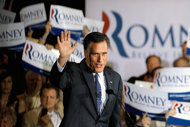Romney sets sights on Obama after Illinois win

Romney's decisive win in Illinois Tuesday likely won't help him win Obama's home state in the November 6 election, but it has brought him closer to clinching the Republican nod.
He used his victory speech to reprise his attacks on Obama's economic policies and cast the general election as a choice between "economic freedom" and "job-killing regulation."
"Over the past three years this administration has been engaged in an all-out assault on our freedom," Romney told supporters gathered in an affluent Chicago suburb.
"It's time to say these words. This word. Enough. We've had enough."
Underdog Rick Santorum was unbowed by Romney's widening lead, rallying supporters in his home state of Pennsylvania to help him "close this gap and (move) on to victory!"
His campaign vowed earlier Tuesday to take the fight all the way to the Republican convention in August, but it's not clear if Santorum can stop Romney from winning the 1,144 delegates needed to clinch the deal before then.
The former Massachusetts governor already had a commanding delegate lead and Tuesday's resounding win in this midwestern state will provide Romney with momentum ahead of polls in Wisconsin, Maryland and Washington, DC on April 3.
It will also provide Romney with a cushion ahead of an expected Santorum victory in Louisiana on Saturday.
But with many states awarding delegates proportionally, it could take Romney until May or June to reach the majority needed to knock his rivals out of the race.
"The question isn't who's the nominee," said Larry Sabato, director of the University of Virginia's Center for Politics. "It's whether Romney soars or limps into (the convention in) Tampa. That's not determined yet."
While Romney may have a better chance of winning over the moderates and independents who often decide general elections, he has failed to rally the Republican party's conservative base in the grueling state-by-state primaries.
US media exit polls in Illinois showed Romney with a surprisingly solid lead among supporters of the ultra-conservative Tea Party movement, however Santorum was the favorite among evangelicals and the "very conservative."
A bloody, protracted battle would help Obama and could also cost Republicans congressional, gubernatorial and state-level seats, especially if Romney isn't able to seal the deal by the time delegate-rich California and four other states hold contests on June 5.
"It may not be possible to win the presidency at that point, but they have to keep the race competitive enough so there isn't a coattail disaster down the ticket," Sabato told AFP.
"If you have an incumbent president winning by a wide margin in this polarized era, the odds are he's going to be bringing in a lot of Democrats with him."
Written off in the early days, Santorum, a former Pennsylvania senator, has steadily notched up wins -- 10 out of 33 contests -- largely with the help of evangelicals and the party's most conservative members.
He aimed to rally those supporters by attacking Romney as an untrustworthy moderate who will say anything to get elected and casting himself as a reliable man of principle on a mission to defend conservative values.
Romney's only mention of his rivals was a brief congratulations for "a hard-fought contest" as he sought to adopt a more presidential air and stuck close to his script with the help of much-maligned teleprompters.
Prior to the Illinois vote Romney had pocketed 516 delegates, while Santorum had won 236 and former house speaker Newt Gingrich had 141, according to the website Real Clear Politics.
Texas Congressman Ron Paul, a small-government champion, has about 66.
Illinois's 56 delegates will be awarded after final results are officially tallied.
Santorum's campaign has been urging Gingrich -- who has won just two contests -- to drop out in order to consolidate the conservative vote.
Romney had 46.7 per cent of the vote in Illinois with 99 per cent of precincts reporting late Tuesday, while Santorum had 35 per cent, Paul had 9.3 per cent and Gingrich had 8 per cent.
What the stars mean:
★ Poor ★ ★ Promising ★★★ Good ★★★★ Very good ★★★★★ Exceptional
Related Contents
Latest News
More News
- Russian President congratulates Vietnamese Party leader during phone talks (January 25, 2026 | 09:58)
- Worldwide congratulations underscore confidence in Vietnam’s 14th Party Congress (January 23, 2026 | 09:02)
- Political parties, organisations, int’l friends send congratulations to 14th National Party Congress (January 22, 2026 | 09:33)
- 14th National Party Congress: Japanese media highlight Vietnam’s growth targets (January 21, 2026 | 09:46)
- 14th National Party Congress: Driving force for Vietnam to continue renewal, innovation, breakthroughs (January 21, 2026 | 09:42)
- Vietnam remains spiritual support for progressive forces: Colombian party leader (January 21, 2026 | 08:00)
- Int'l media provides large coverage of 14th National Party Congress's first working day (January 20, 2026 | 09:09)
- Vietnamese firms win top honours at ASEAN Digital Awards (January 16, 2026 | 16:45)
- ASEAN Digital Ministers' Meeting opens in Hanoi (January 15, 2026 | 15:33)
- ASEAN economies move up the global chip value chain (December 09, 2025 | 13:32)

 Tag:
Tag:




















 Mobile Version
Mobile Version